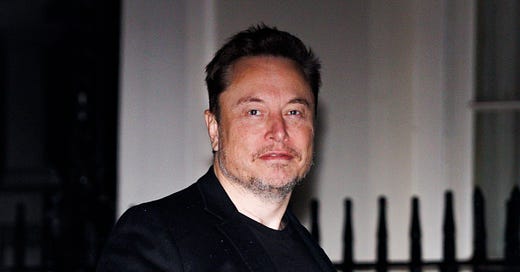
Trump and Musk Take a Hammer to America’s Reputation
Their version of America is selfish, wasteful, and cruel.
A “SPECIAL GOVERNMENT EMPLOYEE” wealthy beyond the dreams of Croesus, chose as his first target the poorest and most vulnerable people on Earth. On Sunday evening, Elon Musk and his peach-fuzz adjutants locked employees of the U.S. Agency for International Development out of their email accounts, shut down the agency website, announced that nearly everyone would be fired, and crowed that USAID had been fed into a “wood chipper.” President Onlooker muttered approvingly that the agency had it coming because it was dominated by “radical left lunatics.” Musk called them criminals.
USAID is a duly constituted government agency created by Congress and the president. By law, it can be shut down only by Congress and the president. The attempt to close it by the whim of a ketamine-popping oligarch is flagrantly illegal, and will eventually, one assumes, be reversed by the courts. But that could take months (and there’s a sting in the tail, which I’ll come to in a minute).
Meanwhile, Americans who work for the agency, most of them overseas, have been thrown into chaos, and the people who benefit from the assistance have been left in the lurch. That includes people on the verge of starvation in Yemen; AIDS patients in sub-Saharan Africa; people clearing landmines in Cambodia; medical workers treating people with malaria, cholera, and measles in Sudan; and those providing medicine, housing, food, and other assistance to Ukraine, among millions of others worldwide. Until last week, USAID was the largest distributor of humanitarian assistance on Earth. Today, by abruptly pulling the plug, the world’s greatest humanitarian country has become one of its least, raising a huge middle finger to those facing hunger, disease, war, and oppression.
Silicon Valley types like to move fast and break things. I guess that’s fine if the only thing you break is your own bank account, but applying that spirit to foreign assistance (again, without a shred of legal authority) means breaking human beings. And it means criminal waste. Wasn’t Musk supposed to be seeking to limit waste? According to two sources with knowledge of foreign assistance activities at the Department of State and USAID, more than 475,000 metric tons of American food commodities (purchased from farmers in Texas, Kansas, Nebraska, and Iowa) have already been ordered and are now at risk of rotting at railroad sidings or ports. Another 29,000 metric tons, valued at $30 million, are reportedly sitting in a Texas warehouse and cannot be shipped to needy people.
Most of the 10,000 people who work for USAID have no idea if they will ever see another paycheck. Those in conflict zones like Ukraine are unsure whether they retain diplomatic status. They’ve been told to come home but they have no guidance about how or whether the government will pay for their transportation. They’ve been locked out of their phones and their computers and feel anxious and isolated.
Like any agency or, frankly, any human organization, USAID has faults. Some of its programs could be streamlined, one employee told me, but “we respond to earthquakes and wars—don’t smash everything because 2 percent have problems!”
The people drawn to work in humanitarian assistance are the polar opposite of Musk. Some were refugees or other recipients of aid when they were young and want to pay it forward. These and others from various backgrounds are nature’s noblemen, drawn from across the country and including doctors, public health specialists, nurses, teachers, truck drivers, and many, many former military members. Most could make much better salaries in the private sector but feel called to help the most vulnerable people in the world. Many accept long separations from their families and endure uncomfortable and often dangerous postings in places that Silicon Valley types don’t frequent. They stand ready, with bags packed, to receive a midnight call. “When there was an Ebola outbreak in 2013,” one USAID employee told me, “doctors with USAID rushed to Uganda to stop the spread. They put their own lives at risk. No one knows about it because they succeeded and Ebola never spread to the [United States]. So much of what we do is unseen, but that doesn’t make it unimportant.”
Now, they are afraid to speak freely. They sound more like dissidents in places like China or Russia than like Americans. They fear they are being monitored and targeted for God-only-knows what kind of accusation or retribution.
FOREIGN AID NEVER POLLS WELL. Many Americans imagine that we spend 25 percent of our budget supporting humanitarian needs in far-flung places. When asked how much would be about right, they suggest about 10 percent. The true figure is less than 1 percent, though our presence—and our bags of grain labeled prominently with the words “From the American People”—is felt in scores of nations around the globe.
Even if they were preaching gender ideology with every shot of penicillin (and they’re not) it would still be worth doing. We should give to the poor both for its own sake—it is basic morality after all—and for the reputation and standing of the United States.
Now for the sting in the tail. The courts will take up Musk’s attack on American benevolence in due course, and while one cannot predict with certainty how they will rule, it’s a reasonably safe bet that they will find that the Trump/Musk demolition project was illegal. Then comes the moment of truth. It remains an open question whether Trump will obey the court. If he does, we will still have a republic. If not, we’ve turned the page.
















